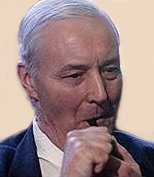|
Andy Prendergast,
young member and GMB officer, met with
Tony Benn
on a visit
to
Appledore.
Here is a description of his day
An evening with Tony Benn and the Appledore ship workers
Considering the fact that he was largely responsible for the ship yard having
been nationalised in the 1970's, few were surprised when Tony Benn added his
voice to the outcry over the closure of Appledore. Employing hundreds of
skilled workers in an area already affected by the exodus of heavy industry, it
closure represented another nail in the lid of British industry.
 At that point it would have been easy for the workers to sit down and accept
their fate. A few lucky ones might have got local jobs that used their skills
and got paid reasonably for doing so. Most of the other would have either have
to leave the area or settle for low skilled jobs or dole queues.
At that point it would have been easy for the workers to sit down and accept
their fate. A few lucky ones might have got local jobs that used their skills
and got paid reasonably for doing so. Most of the other would have either have
to leave the area or settle for low skilled jobs or dole queues.
This is what most of us would have done under the circumstances. There's no
shame in it, after all isn't that how we are supposed to be in this wonderful
flexible labour market that it Blair's Britain?
Fortunately, the workers at Appledore didn't see it like that. Knowing the
value of their skills and the devastation that threatened their town, they
decided to act. First they seized the yard, barricading the gates to stop any
equipment being removed. This was vital, if one single piece was taken by the
bailiffs it would have been the start of an exodus, leaving only a dry dock and
sheds. Without the machinery in it, a ship yard isn't worthy of the name.
Tonight's event was part of this fight to keep the ship yard open. Tony Benn
had already been down to see the workers several times and this benefit was put
on especially to raise money for their hardship fund.
The evening started with a short film about the yard and a co-operative set up
by a number of redundant workers. This was recently charged with building a
monument for the left field in Glastonbury. The monument shows a number of
workers, of all trades and all creeds, pulling in the same direction. It was
difficult to imagine more fitting tribute.
After this, Tony Benn spoke for over an hour. He spoke about his role in
nationalising the yard and bemoaned the fact the very skills which we as a
nation require are those which we are losing at such a rate. He pointed out
that in 1950 forty percent of ship building was carried out in Britain, now we
barely register. He spoke to being bullied by Henry Ford and of having a go at
Ali G. Afterwards he was presented with an ornament by the local shop stewards.
As impressive as it was, I think it likely that during his long career Tony
Benn has probably received many more ornate gifts but you were left with the
distinct impression that few will mean as much as that one.
 The significance of the night was even greater by virtue of the fact news had
been received that the yard had been bought. Although only small number of the
workers are going to get their jobs back soon, it is hoped that this will
increase once extra work comes in. Through the efforts of the workers alone,
the yard lives to fight another day. As impressive as Tony Benn was, the night
belonged to those workers who stood when others would have left. Who fought
when others would have surrendered, and who most importantly helped keep a town
alive.
The significance of the night was even greater by virtue of the fact news had
been received that the yard had been bought. Although only small number of the
workers are going to get their jobs back soon, it is hoped that this will
increase once extra work comes in. Through the efforts of the workers alone,
the yard lives to fight another day. As impressive as Tony Benn was, the night
belonged to those workers who stood when others would have left. Who fought
when others would have surrendered, and who most importantly helped keep a town
alive.
|